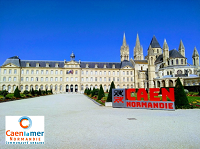Orateur
Description
In an ultra-relativistic heavy-ion collision, the geometry of the interaction region is shaped by the (random) positions of the nucleons that populate the colliding nuclei during the ultra-short duration of the collision process. As the created system expands hydrodynamically to the final state, the details of the spatial distributions of these nucleons (clustering, deformations, skin diffuseness) leave specific imprints in the the collective flow of the produced hadrons. Thanks to advanced Bayesian analysis tools, we are today able to extract, with quantified uncertainties, information about the structure of the colliding nuclei from the measured hadron distributions. Recently, we have extracted the neutron skin of the nucleus $^{208}$Pb from LHC data, which has lead to the first determination of the slope parameter of the symmetry energy, $L$, in this context. Similar results will come in future from isobar collisions involving $^{96}$Ru and $^{96}$Zr nuclei performed at RHIC. In this contribution, I review the basic features of high-energy nuclear collisions that enable us to connect information on nuclear structure to features of the final-state particle spectra. I discuss prospects for refined extractions of the nuclear symmetry energy and other fundamental nuclear properties from high-energy data.

